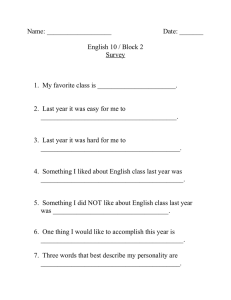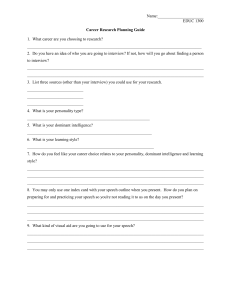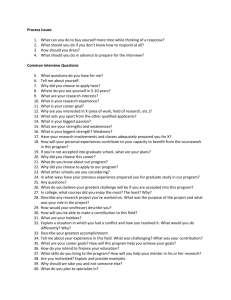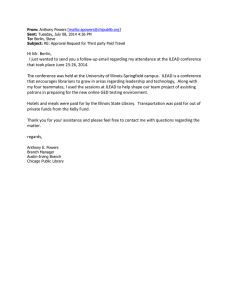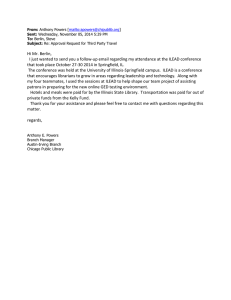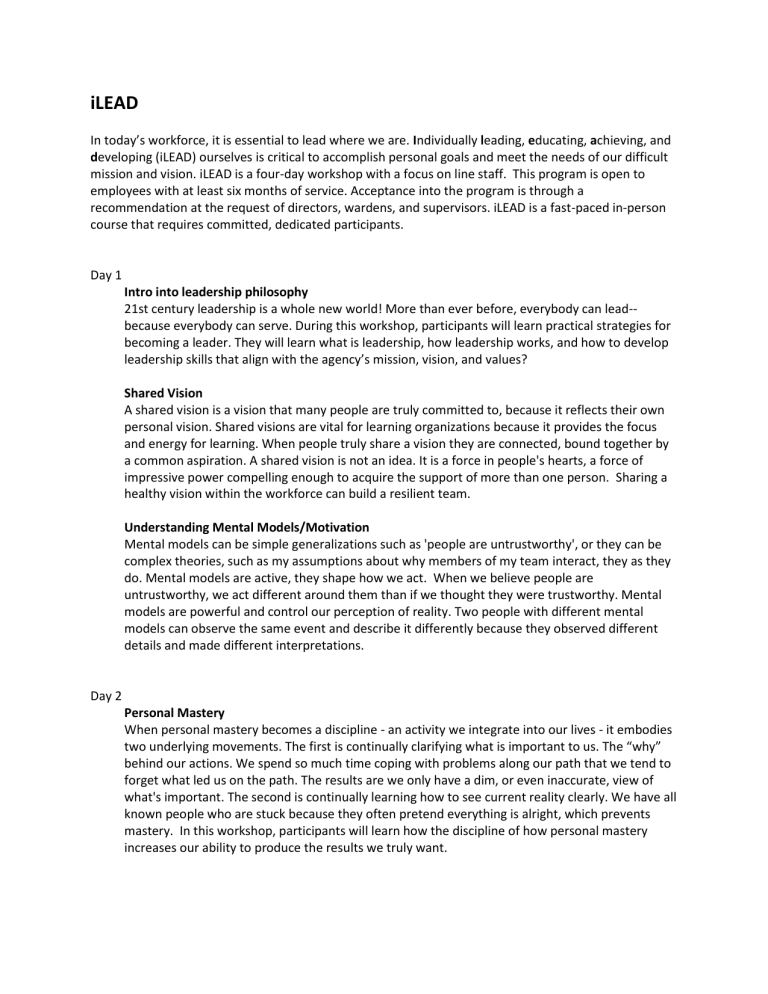
iLEAD In today’s workforce, it is essential to lead where we are. Individually leading, educating, achieving, and developing (iLEAD) ourselves is critical to accomplish personal goals and meet the needs of our difficult mission and vision. iLEAD is a four-day workshop with a focus on line staff. This program is open to employees with at least six months of service. Acceptance into the program is through a recommendation at the request of directors, wardens, and supervisors. iLEAD is a fast-paced in-person course that requires committed, dedicated participants. Day 1 Intro into leadership philosophy 21st century leadership is a whole new world! More than ever before, everybody can lead-because everybody can serve. During this workshop, participants will learn practical strategies for becoming a leader. They will learn what is leadership, how leadership works, and how to develop leadership skills that align with the agency’s mission, vision, and values? Shared Vision A shared vision is a vision that many people are truly committed to, because it reflects their own personal vision. Shared visions are vital for learning organizations because it provides the focus and energy for learning. When people truly share a vision they are connected, bound together by a common aspiration. A shared vision is not an idea. It is a force in people's hearts, a force of impressive power compelling enough to acquire the support of more than one person. Sharing a healthy vision within the workforce can build a resilient team. Understanding Mental Models/Motivation Mental models can be simple generalizations such as 'people are untrustworthy', or they can be complex theories, such as my assumptions about why members of my team interact, they as they do. Mental models are active, they shape how we act. When we believe people are untrustworthy, we act different around them than if we thought they were trustworthy. Mental models are powerful and control our perception of reality. Two people with different mental models can observe the same event and describe it differently because they observed different details and made different interpretations. Day 2 Personal Mastery When personal mastery becomes a discipline - an activity we integrate into our lives - it embodies two underlying movements. The first is continually clarifying what is important to us. The “why” behind our actions. We spend so much time coping with problems along our path that we tend to forget what led us on the path. The results are we only have a dim, or even inaccurate, view of what's important. The second is continually learning how to see current reality clearly. We have all known people who are stuck because they often pretend everything is alright, which prevents mastery. In this workshop, participants will learn how the discipline of how personal mastery increases our ability to produce the results we truly want. Team Synergy Effective teamwork does not happen by accident. Our mission proves that effective teamwork is more important than ever. Collaborating with others to meet a common goal is one of the hardest things to accomplish in the workplace. During this workshop, participants learn how to positively contribute to a team both as a leader and a follower. Communication, problem solving, defining key characteristics and components of high performing teams are explored. Participants will be able to describe why trust, conflict resolution, commitment, accountability, and attention to details are key underpinnings for the success of all teams. Conflict Resolution Every day we are faced with conflict. Traffic, spouses, children, money, schedules, personalities, etc. How we deal with conflict greatly affects our well-being and how we accomplish mission critical tasks at work. In this Conflict Resolution course, participants will learn how to manage and deal with conflict. Participants will also learn decision making skills and how to deal with the impact of the decisions they make. Day 3 Personality Assessment and differences Often, we are aware of our personality traits; however, we are unaware of how our personality impacts the work environment. Whether we're an introvert, extrovert, over sensitive, or even a little rough around the edges we still need to be aware and conscious of everyone else's personality. In this course, participants will take a personality assessment, compare it to others in the class, and learn the importance of being considerate of everyone, even when we are exactly alike or completely different. Additionally, participants will learn how this skill can help them grow and lead in the department. Understanding Generational differences While it's important to treat everyone as an individual and not stereotype them based on their generation, there are some general differences to keep in mind. You may not realize it but how you communicate with each other, especially those in different generations than you, plays a huge role in productivity in the workplace. This workshop will teach you how to deal with everyone around you while teaching you how to appreciate what different generations bring to the table. Social Communication Skills 2.0 In SCS you learned your emotional intelligence strengths and weaknesses. SCS 2.0 will help to master emotional intelligence that builds on knowledge and skills learned in the first level of SCS. Participants in this workshop will learn how to think in new ways about how their emotions operate day-to-day moments that often go undetected, dismissed and unresolved. Managing up It is not easy identifying the obstacles that prevent us from having a positive and productive relationship with our manager or supervisor. Managing up takes practice and great communication skills. When you manage up your needs and your supervisors need get met and that makes for a productive, positive shift that brings the team even closer to meeting the mission and vision of our department. Day 4 Interviewing skills At a time when more and more employers are hiring for “fit” and training for skill, the interview is more important than ever. This workshop focuses on interview preparation. Participants will be provided the steps necessary to have a successful interview. The workshop will focus on preparing for the interview, learning how to respond to different types of interview questions, and the appropriate follow-up process after an interview has taken place. Mindfulness of Reducing Stress Stress, and the resulting burnout, impacts every part of our physical, social, and psychological self and can have dramatic effects. In today’s fast-paced, high-demand world, it is harder to just stop, breathe, and live in the moment. With the right tools and some simple mindfulness strategies, one has the power to greatly decrease the negative effects of stress and increase personal health, happiness, and well-being. This workshop will investigate the stages of burnout, how to prevent burnout, and stress management strategies to continue to be a high performer. What's next for me? Creating an individualized career map involves identifying other positions within the organization that meet the employee's interests. The position may be a lateral move into a different job family or a promotion. In this workshop, participants are introduced to the vast opportunities for growth that TDOC has available. Effective career mapping offers experiences, interests and motivation while at the same time requiring the employee to develop a certain degree of new knowledge, skills and abilities (KSAs) to give him or her something to work toward and stay engaged.

